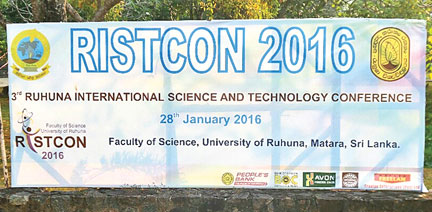Climate change demands new strategies - Don
Climate change calls on humanity to adopt a new culture of innovation
that favours sustainability over profitability, Director, Centre for
Development Research (ZEF), University of Bonn, Prof. Dr Christian
Borgemeister told the third Ruhuna International Science and Technology
Conference (RISTCON), in Matara recently.
 Prof. Borgeimister themed his speech on 'Facing Future Challenges:
Assessing the Role of Science and Technology in Climate Change
Mitigation and Adaptation'. RISTCON 2016 was organised by the Faculty of
Science of the University of Ruhuna. Prof. Borgeimister themed his speech on 'Facing Future Challenges:
Assessing the Role of Science and Technology in Climate Change
Mitigation and Adaptation'. RISTCON 2016 was organised by the Faculty of
Science of the University of Ruhuna.
Excerpts:
"Climate change has become a dramatic and often bitter reality in
many places. The period between 2011-2015 was the warmest five years on
record. According to the WMO world temperature has reached a symbolic
1°C above the mean temperature of the pre industrial era. The warming of
the planet has resulted in many disasters in the recent past.
In May and June 2015, India and Pakistan were struck by heat waves
while the California mega drought reached historic proportions. The 20
million megapolis city of Sao Paulo faced its worst drought crisis in 80
years.
At the same time heavy precipitation and flooding posed serious
problems to many societies and their economies. In January last year,
Malawi in South East Africa was hit by heavy floods while in July,
Myanmar and Bangladesh suffered from flooding and landslides. Apart from
the direct loss of human lives, these extreme weather conditions
manifest as increased poverty, temporary displacement and the heightened
likeliness of the outbreak of epidemics.
It is known that anthropogenic climate change and weather extremes
are closely connected. This means that the extreme weather events the
world has seen in the last few years may just be a preview of future
catastrophes. There should be no doubt that Anthropogenic climate change
is among the greatest challenges that humanity faces in the 21st
Century.
Climate catastrophe
The looming climate catastrophe is reminiscent of the threat of
nuclear apocalypse in the era of the Cold War. In a business as usual
scenario, containing greenhouse gas emissions at present levels will
lead to a situation where large parts of the planet may become virtually
uninhabitable by the end of the century.
What is more worrying is that scenarios based on state-of-the-art
computer modelling indicate that with current emission levels, it will
be hard to keep mean temperature below 2°C above pre-industrial times.
Not only would climate change devastate whole regions and according to a
host of geographers, economists and political scientists, it would
increase the conflicts over vital resources such as water or arable land
by large degrees.
It takes political will to reverse these trends. The good news is
that the international community has understood the dangers of climate
change and nations have agreed to a new treaty effective from 2020, at
the COP 21 climate summit held in Paris in December 2015. The Paris
agreement has met harsh criticism and enthusiastic support.
Whatever the outcome of COP 21 may be, it is clear that science and
technology have a key role in paving the way. The political ecology
approach is based on one essential question Who profits and who looses
out from interactions between humans and nature? A number of scholars
worry about the potential of climate change to destabilise societies and
cause conflicts over natural resources.
The conflict and peace studies community are engaged in serious
debate whether the link between climate change and conflict is valid and
straightforward, and which factors play into the equation".
The climate change mitigation and adaptation measures also have the
potential to cause conflict on a massive scale. Hydro electric mega
dams, nuclear power, carbon capture and storage (CCS), biofuels and
genetically modified organisms are a few examples.
Construction of dams was often associated with displacement and
forced resettlement of local populations which made them highly
conflictual to begin with. It is true that the operation of hydro
electric power plants unlike coal power plants does not result in the
emission of carbon dioxide but the flooding of forests lead to an
anaerobic process and the release of large amounts of methane which is
an extremely potent green house gas.
The nuclear disasters in Chernobyl in 1986 and Fukushima in 2011 have
shown that accidents do occur and that nuclear energy is not the way
out. Nuclear waste disposal is another problem we face. Building nuclear
power plants and the implementation of Carbon Capture and Storage is
extremely costly. Even the promotion of biofuels as a possible
alternative to fossil fuels has been subjected to heavy criticism from
environmentalists and advocacy groups.
Nuclear power, large dams, biofuels, like fossil fuel are part of an
outdated economic model. They symbolise the pathways of accelerated
modernity that created the situation the world is in today. It is
preferable to phase out the use of these technologies instead of
presenting slightly modified, newer versions as solutions to climate
change.
The alternative, however, is not a de-industrialisation or an end to
technological development. There is no going back to an allegedly better
past. Without the progress humanity has made in agriculture, medicine,
engineering and transportation technology over the past centuries, the
world would be a much bleaker place and many millions more would be
threatened by death through starvation and disease.
Humanity must shed thoughtless megalomania and adapt smart
technologies that are cost effective and energy effective, easy to
maintain and repair and to deconstruct and built to scale." - Text and
pic: Priyan de Silva, Matara Cor. |

